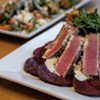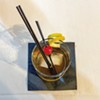Published February 7, 2007 at 5:28 p.m.
At Burlington's Trattoria Delia, they're intense about Italian wine. "Wine is an integral part of the food in Italy, and of the culture," says Tom Delia, 46, who owns the St. Paul Street restaurant with his wife Lori, 41. The couple's verve for vino is evident in their 101-strong wine list, which has earned them the Wine Spectator Award of Excellence every year since 1995.
But having a celebrated cellar doesn't mean squat if you can't sell the stuff. That's the job of the waitstaff, who help diners pair their preferred dishes with the perfect beverage. Doing that requires not only a natural aptitude for combining flavors, but also in-depth knowledge of the wine.
Getting up to speed isn't a challenge just for "the Tratt," as fans affectionately call it. Pretty much every restaurant that sells wine does some type of staff training. At Café Shelburne, servers get a booklet full of info about the wines they'll be serving, almost all of which hail from France or California. Servers at the Starry Night Café in Ferrisburgh are encouraged to try wines when they're not working, and they can attend tastings with wine distributors.
The Delias take it up a notch at the Tratt, though. Their servers' required training takes several days and is capped by a seven-page test. To find out what it involves, I'm sitting in on a training for the restaurant's two newest servers, Kellie Colasurdo and Engjell Vrapi. The process we undergo is similar to what servers at the Tratt have experienced since the establishment opened.
When Lori and Tom founded their traditional Italian restaurant in 1993, the dining climate in the area was much less sophisticated than it is today, Lori suggests. "There was so much people were missing in the Italian cuisine, and we wanted to expose them to it." Customers who arrived expecting chicken parmesan or spaghetti with garlic sauce were in for a surprise. One early offering was bollito misto with salsa verde, which consists of mixed boiled meats, often including tongue, pig's trotters and other variety meats, served with a green sauce of parsley, capers, garlic and anchovies. For the rustic batù d'Anatra, duck confit is prepared with sweet and sour yellow and red peppers sautéed with Vermont honey, garlic and balsamic vinegar.
As part of this effort to bring "the true, authentic Italian experience" to Vermont, the Delias filled their wine cellar with varietals that are well known in Italy but relatively unheard of in the States. The selection of whites features wine made with grapes such as Picolit, Kerner and Arneis. Ciliegiolo, Mammolo and Prugnolo show up among the reds. Customers who aren't familiar with these grapes have a hard time knowing whether a given selection will pair well with their food, or even if they'll enjoy the flavor.
To help the uninitiated, the wine list offers a few recommendations. Caselfarneto Verdicchio dei Castello di Jesi Fontevecchia is recommended to go along with zuppa di pesce, a fish soup featuring clams, mussels, scallops, calamari and shrimp. With brasato di cinghiale - wild boar braised in red wine with tomatoes and herbs - the suggested pairing is Giuseppe Cortese Barbaresco Rabaja. But even with these hints, customers may still feel intimidated by the menu's abundance of mysterious Italian words, not to mention prices that range from $6.50 a glass to $289 a bottle, and default to "Give me a glass of the house white," or "I'll just have some Chianti."
That response is what the Tratt's wine course is designed to prevent. The training begins with the whites. Manager Jon Griesser, a three-year employee, starts us off with an ample pour of the "house white" - a Pinot Grigio, which, he says, "leaves much to be desired" compared with other wines. We move on through every white served by the glass, discussing each one and jotting tasting notes. Griesser instructs us to pay particular attention to the color of each wine and to aromas - also called the wine's "nose" - in addition to the taste. When I suggest that one wine tastes like an underripe strawberry, he agrees. But my description of another one as having an aroma reminiscent of potato chips elicits teasing.
Each time Griesser pours a new glass, he holds up a map of Italy to point out where the wine comes from. His patter includes detailed information about various kinds of grapes and particular vineyards and regions of Italy. We learn that the Kerner grape, a cross between Riesling and Shiava first bred in 1969, was named after Justinus Kerner, a 19th-century poet and composer of drinking songs. Griesser also explains that wines from Sardinia sometimes have a "saline or brackish" flavor imparted by the light spray of sea salt that settles on the grapes each evening. "There has to be a little bit of academia that goes with the job, or else you're just a waitron," he suggests.
Sadly for me, trying the really high-end wines isn't part of the training. "So how does a server describe a wine they've never tried?" I pester. "Isn't it even more important when a customers is thinking of dropping over 100 bucks?" It's not that I'm hoping to poke a hole in their tasting theory; I just want to get myself a glass of prized Barrolo. No luck.
Lori explains that it's enough to understand the regional characteristics of grapes and know the flavors a particular varietal imparts. Describing a wine in overly specific terms can backfire. "Wine is an agricultural product, and it changes," she says. "It's so subjective, but people are expecting . . . that you'll open the bottle and there will be confetti coming out or something. We're not certain we can tell them what the wine is like, because we don't know their background or their tastes or their palate." In other words, if you describe how a wine tastes to you and the customer's palate doesn't agree, you may end up with a disappointed patron.
On day two - red wine day - Griesser is really in the groove, offering pithy sound bites along with the sips. As he pours a Sardinian "riserva" wine - one that was aged before release - he points out, "You can age crap longer and call it 'riserva.'" This is no crap, though. The wine has an aroma of cedar and tastes like ripe berries. "Wines by the glass are supposed to have wide appeal," Griesser says. "They should be great examples or benchmarks."
Understanding the benchmarks appears to be the key to coping with such a huge wine list. Being able to describe varietals, knowing the kinds of wines produced in the various regions of Italy, and always asking questions are the building blocks of a successful server.
On day three, Lori walks us through the complicated world of dessert wines, and throws in a couple of spirits for good measure. As we swirl and sniff amber and orange liquids that taste of orange peel and hazelnuts, I keep in mind the lesson I learned the day before - if I understand how these wines are made and how those processes affect the flavor, I should be able to sell them to the customers. But, as I breathe in the aromas of red cherries and chocolate from a ruby-red glass of Bussola Recioto della Valpolicella, Lori drops a bomb. "Do you want to take the test?"
"I don't think I'll pass," I reply, blushing. Luckily, she lets me off the hook and instead hands me a copy of the quiz to look over. As I leaf through the pages, I'm relieved that I don't have to prove myself. One question describes a three-course Italian dinner and asks, "What wine or wines would you recommend?" With more than 100 to choose from, that's not so easy. But what does the test mean to those who are actually starting work at the Tratt?
"If you don't do well on the test, it means we haven't done our job well," Lori says. "It's an indicator of how well we've trained the person and how seriously they take what we are going to do. We need a server who is intelligent, who can speak well in a professional manner and be informative. The only way you can succeed is empowering them."
I may not have enough knowledge to pass the Tratt's test - for one thing, I haven't read through the huge training binder Griesser makes up for each new staff member, and for another, I haven't gone through the culinary portions of the training. But after three intensive wine sessions, I have no doubt that I'll feel a lot more confident next time I place an order at an Italian restaurant.
More By This Author
Speaking of Food, summer Pick: Burlington
-

Q&A: Howard Fisher Delivers Meals on Wheels With a Side of Good Cheer
Dec 20, 2023 -

Video: Howard Fisher Delivers Meals on Wheels
Dec 14, 2023 -

Q&A: Alexis Dexter Rescued 57 Shelter Cats During the July Flood
Sep 13, 2023 -

Video: Two Months After the Flood, Alexis Dexter Rebuilds Kitty Korner Café in Barre and Continues to Rescue Cats
Sep 7, 2023 -

Video: Saying Goodbye to Burlington’s Penny Cluse Café
Nov 17, 2022 - More »
Comments
Comments are closed.
From 2014-2020, Seven Days allowed readers to comment on all stories posted on our website. While we've appreciated the suggestions and insights, right now Seven Days is prioritizing our core mission — producing high-quality, responsible local journalism — over moderating online debates between readers.
To criticize, correct or praise our reporting, please send us a letter to the editor or send us a tip. We’ll check it out and report the results.
Online comments may return when we have better tech tools for managing them. Thanks for reading.













































